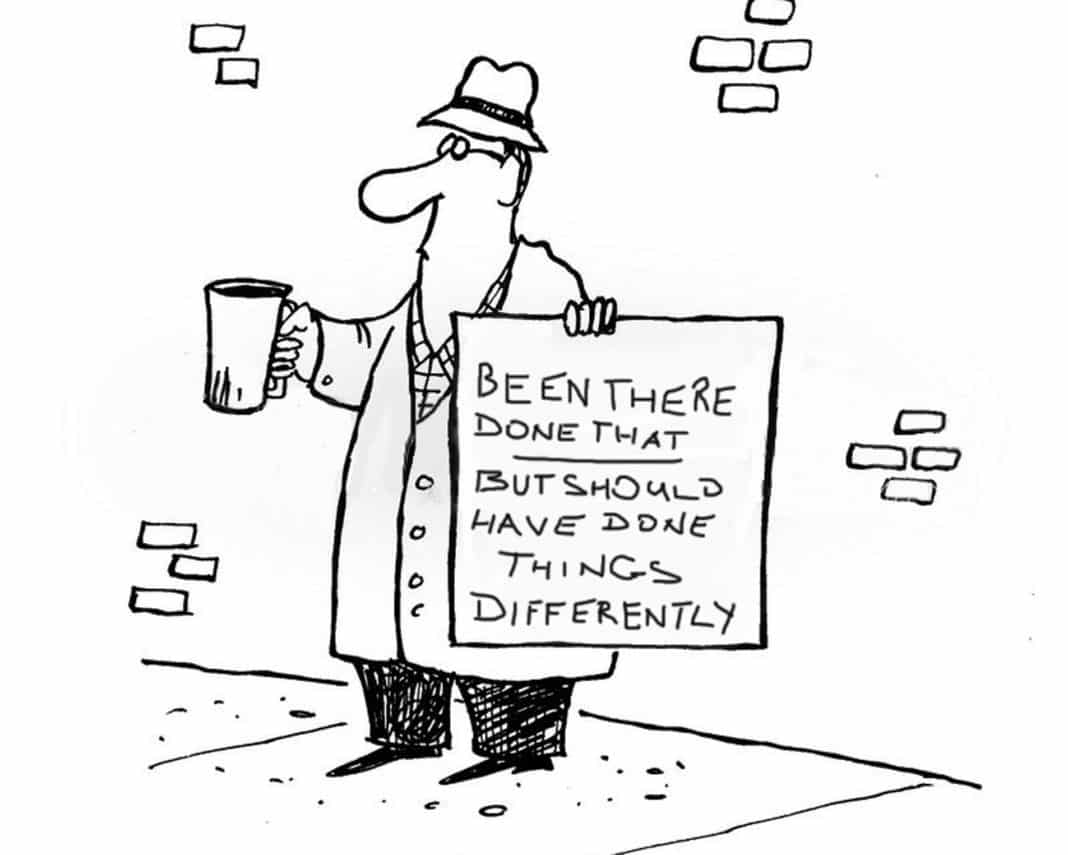
You caught me in the middle of a mistake, dear readers. I have just this moment taken time out from pondering my mistake so I can fill this week’s space here. The trouble with mistakes is that you only see them in the rear-view mirror … never up ahead. Am I overly concerned about this mistake, or am I beating myself up over it? Well, not in the least, because I know from experience that ‘this too shall pass.’
I also know that I am in good company while coping with this mistake. It is a fact that winners make more mistakes than the individual who is mistake-free. In fact, sitting around and doing nothing is probably the biggest mistake of all. A friend of mine used often quip that ‘the less you do, the less mistakes you make! This was only a joke with David, because the same dude was a trier who never gave up trying.
“The man who never made a mistake never made anything”, is an old saying which is very true. Twenty-odd years ago I completed a Brian Treacy management course, hosted by Athlone’s Kevin Fahy. During one of the lectures, Kevin showed us the findings of a study which showed that even the most successful managers get it wrong 70 percent of the time. Hard to believe, but the 30 percent ‘right calls’ were enough to be a winner. The important message here is to make decisions and to keep on making them. Thomas Edison said; “I have not failed. I’ve just found 10,000 ways that won’t work.” Making mistakes is one of the most effective ways to gain new ideas. We are always a little wiser after each mistake.
I have been lucky in the past insofar as the ones I got right paid for my mistakes. Mistakes help us to gain knowledge for the next attempt. Without making mistakes we would lose countless opportunities to better ourselves.
My father once claimed ‘I don’t make mistakes!’ This was his immediate response when we got him ruffled at a time when he was completely in the wrong. My brother, Willie chanced telling him; ‘Daddy, I think you are making a mistake,’ to which came the immortal reply and that line which can be thrown around among my siblings to this day.
Mistakes make us resilient because we learn how to deal with adversity. They leave us better equipped for the challenges that lie ahead, because the comfort zone is not the home of doers. As well as teaching us more about ourselves, we also learn a lot about other people from our own mistakes. We get to see a different side of the people we deal with when the thing goes wrong.
I’ll always remember the late Pat Quinn, of ‘Quinnsworth’ being interviewed by Gay Byrne after the flamboyant businessman went bust. Pat said he was wrong about half the people he worked with. ‘Half of those I thought I could rely on, turned their backs on me; and half of those I expected nothing from, stood by me when the business collapsed.’

Everything we try for the first time is an experiment. For me, one of life’s greatest thrills is to grab hold of an idea and make it work. Making it work entails falling back for reference on the 70 per cent of decisions that were the wrong one at the time. Yes, bad timing is one of the most common mistakes.
Mistakes help us to understand ourselves. We become better people for admitting we got it wrong and we can measure our strengths alongside those weaknesses. A bit of humanity – not to mention humility should be shown at this stage; especially when a mistake affects other people. The number one cause of business collapse is ego. An ego trip will prevent the person at the top from admitting his or her mistake, as the ship ploughs on Titanic like. The banking collapse is a perfect example of egotistical men in striped suits who all denied (and still deny) getting it wrong – even as the house of cards collapsed around them.
Mind you, the opposite side of that coin is that every time a doer gets it wrong, everyone else knew ‘that couldn’t work!’ When you raise your head above the parapet to try something different and make a mistake, you will hear a chorus of voices proclaiming that ‘I could have told him he was wasting his time!’ Close your ears and don’t listen: Instead get on with what may be your newest mistake, or very likely the breakthrough you have been seeking. The one you get right will more than compensate for all your mistakes. Just don’t stop making those mistakes!
Don’t Forget
The computer is a great invention. Mistakes are nobody’s fault any more.





